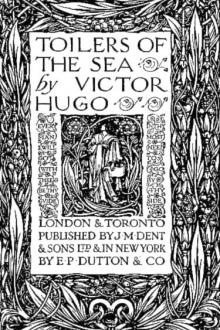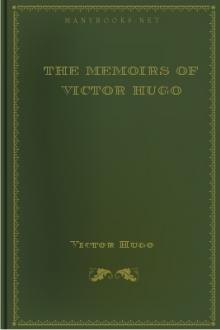Toilers of the Sea by Victor Hugo (trending books to read txt) 📕

- Author: Victor Hugo
- Performer: -
Book online «Toilers of the Sea by Victor Hugo (trending books to read txt) 📕». Author Victor Hugo
Lethierry's eye had just fallen upon Caudray.
Douce and Grace had done as they were directed. Two candles placed upon the table cast a light upon Gilliatt from head to foot.
"There's a fine fellow," said Mess Lethierry.
Gilliatt's appearance was hideous.
He was in the condition in which he had that morning set sail from the rocks; in rags, his bare elbows showing through his sleeves; his beard long, his hair rough and wild; his eyes bloodshot, his skin peeling, his hands covered with wounds; his feet naked. Some of the blisters left by the devil-fish were still visible upon his arms.
Lethierry gazed at him.
"This is my son-in-law," he said. "How he has struggled with the sea. He is all in rags. What shoulders; what hands. There's a splendid fellow!"
Grace ran to Déruchette and supported her head. She had fainted.
II THE LEATHERN TRUNKAt break of day St. Sampson was on foot, and all the people of St. Peter's Port began to flock there. The resurrection of the Durande caused a commotion in the island not unlike what was caused by the Salette in the south of France. There was a crowd on the quay staring at the funnel standing erect in the sloop. They were anxious to see and handle the machinery; but Lethierry, after making a new and triumphant survey of the whole by daylight, had placed two sailors aboard with instructions to prevent any one approaching it. The funnel, however, furnished food enough for contemplation. The crowd gaped with astonishment. They talked of nothing but Gilliatt. They remarked on his surname of "malicious Gilliatt;" and their admiration wound up with the remark, "It is not pleasant to have people in the island who can do things like that."
Mess Lethierry was seen from outside the house, seated at a table before the window, writing, with one eye on the paper and another on the sloop. He was so completely absorbed that he had only once stopped to call Douce and ask after Déruchette. Douce replied, "Mademoiselle has risen and is gone out." Mess Lethierry replied, "She is right to take the air. She was a little unwell last night, owing to the heat. There was a crowd in the room. This and her surprise and joy, and the windows being all closed, overcame her. She will have a husband to be proud of." And he had gone on with his writing. He had already finished and sealed two letters, addressed to the most important shipbuilders at Brême. He now finished the sealing of a third.
The noise of a wheel upon the quay induced him to look up. He leaned out of the window, and observed coming from the path which led to the Bû de la Rue a boy pushing a wheelbarrow. The boy was going towards St. Peter's Port. In the barrow was a portmanteau of brown leather, studded with nails of brass and white metal.
Mess Lethierry called to the boy:
"Where are you going, my lad?"
The boy stopped, and replied:
"To the Cashmere."
"What for?"
"To take this trunk aboard."
"Very good; you shall take these three letters too."
Mess Lethierry opened the drawer of his table, took a piece of string, tied the three letters which he had just written across and across, and threw the packet to the boy, who caught it between his hands.
"Tell the captain of the Cashmere they are my letters, and to take care of them. They are for Germany—Brême viâ London."
"I can't speak to the captain, Mess Lethierry."
"Why not?"
"The Cashmere is not at the quay."
"Ah!"
"She is in the roads."
"Ay, true; on account of the sea."
"I can only speak to the man who takes the things aboard."
"You will tell him, then, to look to the letters."
"Very well, Mess Lethierry."
"At what time does the Cashmere sail?"
"At twelve."
"The tide will flow at noon; she will have it against her."
"But she will have the wind," answered the lad.
"Boy," said Mess Lethierry, pointing with his forefinger at the engine in the sloop, "do you see that? There is something which laughs at winds and tides."
The boy put the letters in his pocket, took up the handles of the barrow again, and went on his way towards the town. Mess Lethierry called "Douce! Grace!"
Grace opened the door a little way.
"What is it, Mess?"
"Come in and wait a moment."
Mess Lethierry took a sheet of paper, and began to write. If Grace, standing behind him, had been curious, and had leaned forward while he was writing, she might have read as follows:—
"I have written to Brême for the timber. I have appointments all the morning with carpenters for the estimate. The rebuilding will go on fast. You must go yourself to the Deanery for a licence. It is my wish that the marriage should take place as soon as possible; immediately would be better. I am busy about the Durande. Do you be busy about Déruchette."
He dated it and signed "Lethierry." He did not take the trouble to seal it, but merely folded it in four, and handed it to Grace, saying:
"Take that to Gilliatt."
"To the Bû de la Rue?"
"To the Bû de la Rue."
BOOK III THE DEPARTURE OF THE CASHMERE I THE HAVELET NEAR THE CHURCHWhen there is a crowd at St. Sampson, St. Peter's Port is soon deserted. A point of curiosity at a given place is like an air-pump. News travel fast in small places. Going to see the funnel of the Durande under Mess Lethierry's window had been, since sunrise, the business of the Guernsey folks. Every other event was eclipsed by this. The death of the Dean of St. Asaph was forgotten, together with the question of the Rev. Mr. Caudray, his sudden riches, and the departure of the Cashmere. The machinery of the Durande brought back from the Douvres rocks was the order of the day. People were incredulous. The shipwreck had appeared extraordinary, the salvage seemed impossible. Everybody hastened to assure himself of the truth by the help of his own eyes. Business of every kind was suspended. Long strings of townsfolk with their families, from the "Vesin" up to the "Mess," men and women, gentlemen, mothers with children, infants with dolls, were coming by every road or pathway to see "the thing to be seen" at the Bravées, turning their backs upon St. Peter's Port. Many shops at St. Peter's Port were closed. In the Commercial Arcade there was an absolute stagnation in buying and selling. The Durande alone obtained attention. Not a single shopkeeper had had a "handsell" that morning, except a jeweller, who was surprised at having sold a wedding-ring to "a sort of man who appeared in a great hurry, and who asked for the house of the Dean." The shops which remained open were centres of gossip, where loiterers discussed the miraculous salvage. There was not a foot-passenger at the "Hyvreuse," which is known in these days, nobody knows why, as Cambridge Park; no one was in the High Street, then called the Grande Rue; nor in Smith Street, known then only as the Rue des Forges; nobody in Hauteville. The Esplanade itself was deserted. One might have guessed it to be Sunday. A visit from a Royal personage to review the militia at the Ancresse could not have emptied the town more completely. All this hubbub about "a nobody" like Gilliatt, caused a good deal of shrugging of the shoulders among persons of grave and correct habits.
The church of St. Peter's Port, with its three gable-ends placed side by side, its transept and its steeple, stands at the water's side at the end of the harbour, and nearly on the landing place itself, where it welcomes those who arrive, and gives the departing "God speed." It represents the capital letter at the beginning of that long line which forms the front of the town towards the sea.
It is both the parish church of St. Peter's Port and the chief place of the Deanery of the whole island. Its officiating minister is the surrogate of the bishop, a clergyman in full orders.
The harbour of St. Peter's Port, a very fine and large port at the present day, was at that epoch, and even up to ten years ago, less considerable than the harbour of St. Sampson. It was enclosed by two enormous thick walls, beginning at the water's edge on both sides, and curving till they almost joined again at the extremities, where there stood a little white lighthouse. Under this lighthouse, a narrow gullet, bearing still the two rings of the chain with which it was the custom to bar the passage in ancient times, formed the entrance for vessels. The harbour of St. Peter's Port might be well compared with the claws of a huge lobster opened a little way. This kind of pincers took from the ocean a portion of the sea, which it compelled to remain calm. But during the easterly winds the waves rolled heavily against the narrow entrance, the port was agitated, and it was better not to enter. This is what had happened with the Cashmere that day, which had accordingly anchored in the roads.
The vessels, during the easterly winds, preferred this course, which besides saved them the port dues. On these occasions the boatmen of the town, a hardy race of mariners whom the new port has thrown out of employment, came in their boats to fetch passengers at the landing-place or at stations on the shore, and carried them with their luggage, often in heavy seas, but always without accident, to the vessels about to sail. The east wind blows off the shore, and is very favourable for the passage to England; the vessel at such times rolls, but does not pitch.
When a vessel happened to be in the port, everybody embarked from the quay. When it was in the roads they took their choice, and embarked from any point of the coast near the moorings. The "Havelet" was one of these creeks. This little harbour





Comments (0)